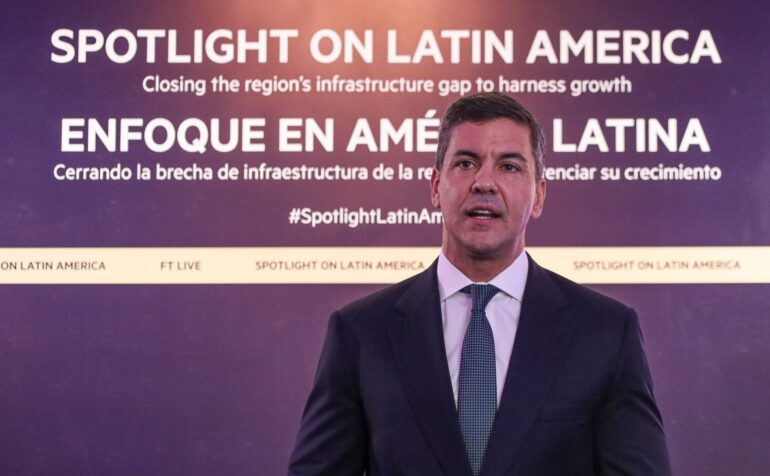At a dinner briefing yesterday at the Palacio de López in Asunción, Paraguayan President Santiago Peña was bullish about the prospects for the Paraguayan economy, and stressed that the country is well placed to continue growing.
The event, organised by the Financial Times as part of their ‘Spotlight on Latin America’ series, focused on infrastructure growth, investor-friendly partnerships, and the impact that continued improvements in these areas can have on the region.
Peña stressed that although Paraguay has advanced in recent years, there was plenty more to come. “We are very far from the Paraguay that we know we can develop,” he said, laying out his aims for the economy.
“We want to take Paraguay from 6,000 to 15,000 dollars per capita, then focus on a series of reforms to bring us to the standard of the OECD countries; that is the standard we are looking for,” he stressed.
He expected that Paraguay, thanks to the implementation of advances in technology, would increase the productivity of primary economic sectors in particular.
“We believe that this productive model of raw materials with added value and technology will allow us to continue growing in this trend,” he said. “We believe that what will lead us to grow at rates in the order of 8 percent in the next few years is a pulp plant, and the installation of more industries for the production of green hydrogen or ammonia, as a much more sustainable fertilizer”.
He noted that in particular, the introduction of the country’s first pulp plant – which is already in progress as part of a US$3 billion Swedish-Paraguayan joint venture – was expected to have a significant economic impact, with estimates of around a 4% increase to national GDP.
More generally, Peña highlighted that the government understood that foreign investors valued clear rules and stability when making long-term investments into a country.
“We have heard that everywhere, but he also wants what a President tells him to be sustained over time. Over the years, and I think throughout these 20 years, Paraguay has maintained consistency in its economic model, and here lies great strength”, he noted, adding: “We also have the simplicity of the political system, which allows the decisions made by the Government to be sustained throughout the country much easier than the federal system.”
He finished his remarks by reiterating his administration’s commitment to continue investing in education, which is a key tool for growth and, above all, for promoting the well-being of Paraguayans.


